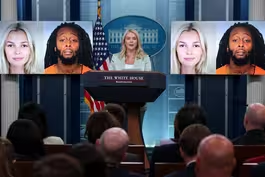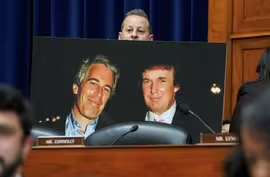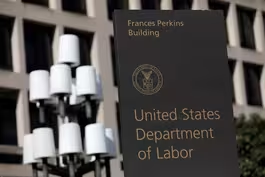
Dan Brown on his new thriller, 'The Secret of Secrets'
Clip: 9/9/2025 | 8m 28sVideo has Closed Captions
Dan Brown on the mysteries and mayhem in his new thriller, 'The Secret of Secrets'
Mysteries and codes, religious rites and scientific formulas. That’s the world of Dan Brown’s thrillers, most famously "The Da Vinci Code," and his latest, "The Secret of Secrets." Secrets and codes are also part of Brown’s own life. Senior arts correspondent Jeffrey Brown discovered that during a visit to the author’s home in New Hampshire. It's for our arts and culture series, CANVAS.
Problems playing video? | Closed Captioning Feedback
Problems playing video? | Closed Captioning Feedback
Major corporate funding for the PBS News Hour is provided by BDO, BNSF, Consumer Cellular, American Cruise Lines, and Raymond James. Funding for the PBS NewsHour Weekend is provided by...

Dan Brown on his new thriller, 'The Secret of Secrets'
Clip: 9/9/2025 | 8m 28sVideo has Closed Captions
Mysteries and codes, religious rites and scientific formulas. That’s the world of Dan Brown’s thrillers, most famously "The Da Vinci Code," and his latest, "The Secret of Secrets." Secrets and codes are also part of Brown’s own life. Senior arts correspondent Jeffrey Brown discovered that during a visit to the author’s home in New Hampshire. It's for our arts and culture series, CANVAS.
Problems playing video? | Closed Captioning Feedback
How to Watch PBS News Hour
PBS News Hour is available to stream on pbs.org and the free PBS App, available on iPhone, Apple TV, Android TV, Android smartphones, Amazon Fire TV, Amazon Fire Tablet, Roku, Samsung Smart TV, and Vizio.
Providing Support for PBS.org
Learn Moreabout PBS online sponsorshipGEOFF BENNETT: Mysteries and codes, religious rites and scientific formulas, that's the world of Dan Brown's thrillers, most famously "The Da Vinci Code" And now there's a new one, "The Secret of Secrets," out today.
Secrets and codes are also part of Brown's own life, as senior arts correspondent Jeffrey Brown discovered during a visit to the author's home in New Hampshire for our arts and culture series, Canvas.
JEFFREY BROWN: We got... DAN BROWN, Author, "The Secret of Secrets": This, I call the Fortress of Gratitude.
(LAUGHTER) JEFFREY BROWN: Fortress of Gratitude.
DAN BROWN: It is -- it's one copy of all my books from around the world.
JEFFREY BROWN: A dark round library with its own secrets.
DAN BROWN: This is my favorite of the seven secret passageways in the House.
JEFFREY BROWN: Hiding memorabilia.
DAN BROWN: That's the first book I wrote at age 5, "The Giraffe, the Pig and the Pants on Fire."
It's a thriller.
And over here we have what's called an inukshuk.
JEFFREY BROWN: In the garden, a looming stone presence.
Inukshuk.
DAN BROWN: Inukshuk, it is an Inuit symbol of protection.
JEFFREY BROWN: In the hallway, another hidden door.
DAN BROWN: So this here is the wild symphony room.
JEFFREY BROWN: Into a room filled with music and stuffed animals related to a children's book titled "Wild Symphony."
All right now, Dan, we have only been together a short time, but you are clearly a quirky, what's the right word, quirky guy.
DAN BROWN: Eccentric?
JEFFREY BROWN: Eccentric?
DAN BROWN: Odd?
JEFFREY BROWN: Yes?
DAN BROWN: Freaky?
They're all true.
JEFFREY BROWN: Yes.
Yes.
Also true, no secret here, Dan Brown is a phenomenally successful author, with more than 250 million books in print, translated into 56 languages.
And his new thriller, he promises, is the biggest, twistiest yet, nothing less than "The Secret of Secrets."
DAN BROWN: It's no secret that I like to write about big topics.
the bloodline of Jesus Christ, artificial intelligence, world population, but I have always felt there's one topic that is bigger than all of them, and it relates to human consciousness, that lens through which we experience reality, we experience ourselves.
And the tricky thing about writing about consciousness is it's a very ethereal topic.
It's kind of squishy.
So the challenge -- and this book took quite a bit of time to write.
The challenge was turning the his ethereal topic into a fast-paced thriller.
JEFFREY BROWN: All the Dan Brown hallmarks are here, including the hero.
TOM HANKS, Actor: And thereby define ourselves.
How do we penetrate years?
JEFFREY BROWN: Harvard symbologist Robert Langdon, played by Tom Hanks in three films made from Brown's novels.
This time, he's in love with noetic scientist Katherine Solomon, whose bold new theory of human consciousness threatens to upend centuries of science and understanding, and has unhappy people threatening her.
There's the magical setting, Prague, an historical home to the occult, a mythological figure, the golem from Jewish mysticism, murder, mayhem, all mixed with those trademark Dan Brown digressions that expound on an ancient cult or linguistic code or scientific theory that will unlock a mystery and, not incidentally, offer his hero another escape.
But every detail, Brown insists, is based on something real, and he's done the research to prove it.
DAN BROWN: I want the reader to know that when Robert Langdon is talking about an experiment that proves precognition is a reality, I want the reader to know, no, this really happened, and here's the date it happened, and here's the scientist that did it.
I think it makes the book relevant and exciting.
JEFFREY BROWN: You feel that a thriller should teach something?
DAN BROWN: Not all thrillers need to teach.
That's what I like to do, because I like to learn, and I think a lot of readers like to learn.
I like to create thrillers that teach.
Ideally, if I have done my job, you don't notice that it's teaching.
You turn the page and say, I had no idea.
That's fascinating.
Really?
That's true?
Amazing.
I will research that later, because, at the moment I have to get Langdon.
He's hanging by his fingernails somewhere.
And so you read the next page to find out what happens to the characters.
That's why we read fiction.
But, along that way, it's peppered with what I consider shocking information, whether it's about Prague or about science or about history.
And that's what's so fun about writing these books, is how much I learn.
JEFFREY BROWN: In fact, Brown's original goal was music.
He grew up near where he lives today.
His father was a math teacher at Phillips Exeter Academy, his mother an accomplished church organist.
After college, he moved to L.A. to try to make it as a singer-songwriter.
DAN BROWN: The record came out and it tanked.
It sold about 12 copies.
And I have heard it recently, and there's a reason it sold 12 copies.
Part of it was timing.
Part of it, just wasn't a great record.
JEFFREY BROWN: He then turned to his other love, writing.
Three novels sold poorly.
But you had known failure.
DAN BROWN: I had known only failure.
JEFFREY BROWN: You had known only failure.
DAN BROWN: Only failure.
JEFFREY BROWN: Yes.
Then, in 2003 came "The Da Vinci Code."
DAN BROWN: So I'm in Portland starting my tour for "The Da Vinci Code."
JEFFREY BROWN: Yes.
And what can only be called overnight success, which Brown learned of through a fax from his editor.
DAN BROWN: And after my talk, I walked into the lobby of this hotel and the guy behind the desk said: "Mr. Brown, we have a fax for you.
This is back in the age of faxes."
JEFFREY BROWN: Right.
DAN BROWN: And this is what he handed me.
JEFFREY BROWN: "Dan, number one."
DAN BROWN: Yes.
Yes.
JEFFREY BROWN: The rest, including controversy and criticism from the Catholic Church over his depiction of Jesus' life, was a pop culture phenomenon, parody included.
DAN BROWN: Somebody sent me this, the pope saying, "You were right."
(LAUGHTER) JEFFREY BROWN: Pope Benedict admits to Dan Brown you were right.
(LAUGHTER) JEFFREY BROWN: And along with the movies and sudden sales of those early books, as well as the new ones, has allowed Dan Brown his quirky life.
DAN BROWN: I do a lot of writing out here.
JEFFREY BROWN: A lot of writing?
DAN BROWN: A lot of writing.
I will have a Dictaphone and just walk this labyrinth.
JEFFREY BROWN: "The Secret of Secrets" took Brown six years to research and write, much of it done in a room up another narrow winding stairway.
There's no formula for thriller writing, he says, but there are rules.
For example, keeping all those intricate plot lines in your head?
DAN BROWN: You don't need to know it all every day.
So that's the first thing.
Really, you're creating a framework, kind of like a scaffolding on which to hang all of this information.
JEFFREY BROWN: Is it true that you started the ending?
DAN BROWN: Yes.
You absolutely must know the ending of a thriller before you start it.
Some of the details and intricate plotting in the middle may not be what you started with.
JEFFREY BROWN: Yes.
DAN BROWN: But the foundation is the same.
You know who the bad guy is.
You know what -- how he gets his just deserts.
You know all that.
You know the twist.
JEFFREY BROWN: Yes.
But do you go down a lot of paths that you just say, this isn't working?
DAN BROWN: Yes.
Thanks for bringing that up.
Yes, I do.
JEFFREY BROWN: Yes?
DAN BROWN: Yes.
Listen, for every - - this is a 200,000-word novel.
I easily wrote a million words, 800,000 of which disappeared.
JEFFREY BROWN: Of course, not everyone will love the results.
Over the years, some critics have not so gently skewered the Dan Brown style.
He's used to it, sort of.
DAN BROWN: What I do, I do very intentionally, specifically.
And you either love it or hate it.
There's not a lot of middle ground.
And that took some getting used to also.
When I... JEFFREY BROWN: It did?
DAN BROWN: Of course it did.
I would love to tell you that success makes me immune.
No, it still hurts.
You wish everybody loved what you do.
They don't.
And when they tell you how they really feel, yes, it hurts.
It just does.
And that's just -- it's the nature of being a creative person for a living.
You put it out in the world.
And somebody told me once - - another very successful author said, when you put a book out, it's like taking a hot air balloon with a target on it, floating it up, handing everybody a gun and saying, what do you think?
And that's what it feels like.
On September 9, that's what it will feel like, when the book comes out.
JEFFREY BROWN: It's certainly a very big balloon, the first printing of "The Secret of Secrets," 1.5 million copies.
For the PBS "News Hour," I'm Jeffrey Brown in New Hampshire.
Brutal murder in N.C. ignites crime, mental health debate
Video has Closed Captions
Clip: 9/9/2025 | 6m 38s | Brutal murder of Ukrainian refugee in N.C. ignites debate about crime and mental health (6m 38s)
Israeli strike in Qatar adds volatility to unstable region
Video has Closed Captions
Clip: 9/9/2025 | 11m 39s | Israeli strike on Hamas in Qatar adds fresh volatility to already unstable region (11m 39s)
MAHA report 'not about actions,' food policy expert says
Video has Closed Captions
Clip: 9/9/2025 | 4m 55s | MAHA report 'not about actions,' food policy expert says (4m 55s)
News Wrap: White House faces fallout of Trump's Epstein ties
Video has Closed Captions
Clip: 9/9/2025 | 8m 9s | News Wrap: White House tries to contain fallout of Trump's Epstein ties (8m 9s)
Revised job numbers raise concerns about economic slowdown
Video has Closed Captions
Clip: 9/9/2025 | 6m 28s | Revised job numbers raise new concerns about economic slowdown (6m 28s)
What's in RFK Jr.'s 'MAHA' report – and what's missing
Video has Closed Captions
Clip: 9/9/2025 | 5m 21s | A look at what's in RFK Jr.'s 'Make America Healthy Again' report – and what's missing (5m 21s)
Providing Support for PBS.org
Learn Moreabout PBS online sponsorship
- News and Public Affairs

FRONTLINE is investigative journalism that questions, explains and changes our world.

- News and Public Affairs

Amanpour and Company features conversations with leaders and decision makers.












Support for PBS provided by:
Major corporate funding for the PBS News Hour is provided by BDO, BNSF, Consumer Cellular, American Cruise Lines, and Raymond James. Funding for the PBS NewsHour Weekend is provided by...





